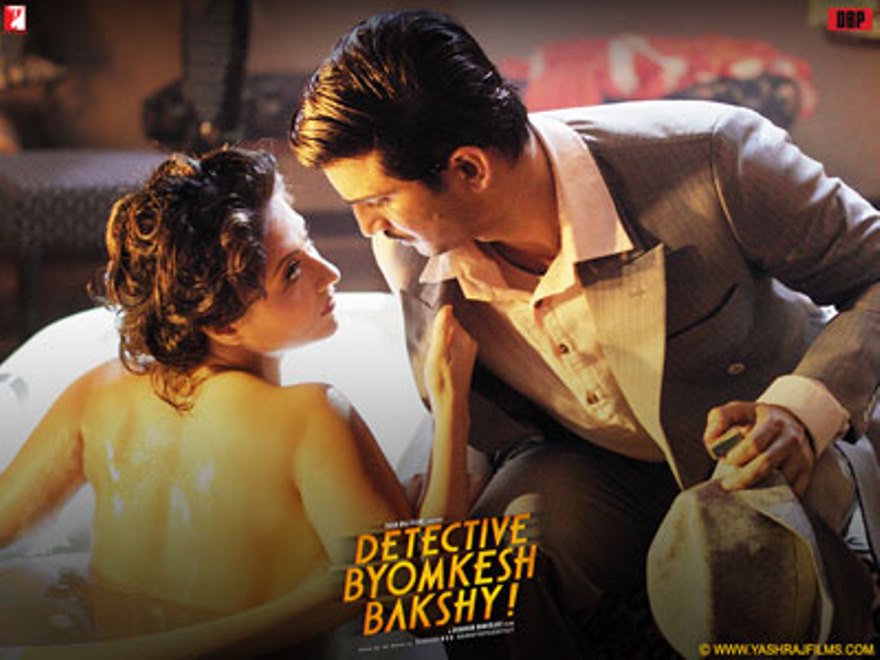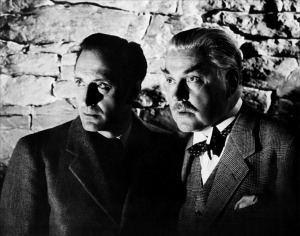Translating deep thinking into common sense
Detective Byomkesh Bakshy: India’s Answer to Sherlock Holmes

By Kurt Keefner
April 9, 2015
SUBSCRIBE TO SAVVY STREET (It's Free)
It’s going to take me a few minutes to get around to this sparkling new Indian detective story, which I think is a deliberate response to Sherlock Holmes. First, I have to give some background.
We seem to be living in a Golden Age of Sherlock Holmes. There are three franchises running simultaneously at present.
We seem to be living in a Golden Age of Sherlock Holmes. There are three franchises running simultaneously at present: the film version starring Robert Downey, Jr.; the British TV series, Sherlock, starring Benedict Cumberbatch; and the American TV series, Elementary, starring Jonny Lee Miller. They are all a lot of fun and lack the turgidity of some of the older versions of the Holmes story.
But they all seem to have a problem, namely, all the Holmeses are what I call “Pretenders.” A Pretender is someone who pastes a fantasy self over their real personality, a fantasy self based on a false sense of life. Most Pretenders are not out to engage reality and other people in an open way but instead use them to entertain themselves or to ward off bad feelings.
 That is the case with the trio of Holmeses. Both Cumberbatch’s and Downey’s flagrantly manipulate Watson and seem baldly to be out for thrills and a feeling of superiority. Cumberbatch’s calls himself a “high-functioning sociopath,” but I don’t think this is correct because he does develop some real feelings for Watson as he goes along, and sociopaths don’t grow.
That is the case with the trio of Holmeses. Both Cumberbatch’s and Downey’s flagrantly manipulate Watson and seem baldly to be out for thrills and a feeling of superiority. Cumberbatch’s calls himself a “high-functioning sociopath,” but I don’t think this is correct because he does develop some real feelings for Watson as he goes along, and sociopaths don’t grow.
Miller’s version is, in my opinion, the best, because his Holmes starts out a Pretender (he’s so into thrills that he was once a drug addict) and slowly grows into someone much more connected to those around him. I’m making an inference here, but I think the Downey and Cumberbatch versions are made by Pretenders, or at least people who want to indulge the Pretender tendencies in their audiences, while the Miller version is made by people who implicitly understand the Pretender type and see through it.
This brings me to our film in question: Detective Byomkesh Bakshy! The exclamation point is part of the title. The film is set in Calcutta during WWII. The British rule and the Japanese are at the door. Bakshy was based on the novels of Saradindu Bandopadhyay, which were written from the mid 1930s up until 1970, but I believe the movie version at least is intended as a commentary on the latest crop of Holmes stories.
The difference between Bakshy and the three Holmeses is striking: Bakshy isn’t a pretender, and it’s not a coincidence.
First, the similarities: Bakshy (played with flair by Sushant Singh Rajput) is a fledgling private detective. He helps where the police can’t or won’t. He is a master of disguises. During the story he acquires a Watson-like sidekick named Ajit (played in a comic turn by Anand Tiwari), who, while not as bright as Bakshy, is a physically strong, sensitive man, and a writer. When Bakshy gets a little over enthused, Ajit slows him down and acts a little bit as a moral center for the story. Bakshy also acquires an opponent, a super-criminal mastermind known as Yang Guang. Yang is an obvious gloss on Professor Moriarty, although his identity is a mystery, more like Keyser Söze from The Usual Suspects. Most tellingly, Bakshy is, even in his first case, a real professional of the small detail and of deduction.
But the difference between Bakshy and the three Holmeses is striking: Bakshy isn’t a Pretender. Now you might just think that that’s a coincidence, since most characters in most stories aren’t Pretenders, but the movie goes out of its way to establish the contrast. In the first scene Ajit seeks out Bakshy in the Indian equivalent of a pool hall.
Ajit is looking for help in finding his missing father. Bakshy, whose face is in shadow, reels off a number of glib and cynical possibilities without any real evidence: Father was involved in a shady deal, father ran off with a woman, etc.. He’s being Mr. Cool, a pretender. Ajit finally gets so angry with Bakshy’s Pretenderism that he decks him.
In the next scene we see Bakshy with Ajit in his father’s apartment, looking at evidence. He is not there under duress. Now he genuinely wants to help. He has broken out of his cool shell and he stays genuine for the rest of the story. I take this as writer/director Dibikar Banerjee’s way of saying “My version of Holmes is an authentic person, not a thrill-seeking user of people.”
Thus begins one of the most complicated plots of a film I have seen since I watched Humphrey Bogart navigate the coils of decadence in The Big Sleep. Bakshy starts putting clues together: Father kept another residence. Bakshy tracks it down and finds a host of colorful tenants: a benevolent doctor who helps members of a party bent on Bengali independence, an amiable Chinese opium dealer (licensed by the British government), an accountant who seems strangely drawn to Father’s paan (the Indian equivalent of chewing tobacco, with psychoactive effects), and a comically terrified houseboy.
The Independence Party figures prominently in the story. The leader of the party moves the plot (in many senses of the word) along. His sister is one of Bakshy’s love interests. His uncle is an industrialist who may be up to his eyebrows in shady deals.
The industrialist’s mistress is a singer and movie star who flirts with Bakshy, testing his resolve to stay detached. Played by Swastika Mukherjee (remember that the Indian swastika, which faces the opposite direction to the Nazi one, is a good luck symbol for Indians); she’s quite sexy and, in one scene, we watch her film a movie scene where she sings a song. This is the only sense in which the Detective Byomkesh Bakshy! is anything like a Bollywood musical. Like the rest of the film, this sequence is pleasantly understated.
I can’t begin to summarize the plot, and I don’t want to give any more away. I will mention that Bakshy is not perfect: He makes mistakes, but he sees through them and acts to deflect the consequences. He gets a little carried away with his enthusiastic ability to deduce the truth, but he is not trying to feel superior to others and so I would say he is not a Pretender.
I cannot praise too highly the production design. The sets and photography create a modern update of the film noir. The music is contemporary and usually works, although the metal song over the closing credits was so repellent that my wife and I had to leave without watching them all the way through.
 Calcutta in the 1940s is a character in the story. Just like the movie Klute takes us on a top-to-bottom tour of New York City in 1971, Bakshy shows us Calcutta with industrialists, college students, firebrand radicals , dope fiends, and men so poor they have to wash up at the community spigot. I don’t know what the real Calcutta was like, but this is a vivid and credible re-creation.
Calcutta in the 1940s is a character in the story. Just like the movie Klute takes us on a top-to-bottom tour of New York City in 1971, Bakshy shows us Calcutta with industrialists, college students, firebrand radicals , dope fiends, and men so poor they have to wash up at the community spigot. I don’t know what the real Calcutta was like, but this is a vivid and credible re-creation.
One testament to the movie’s skill is that despite the large cast of characters, I never became confused as to who was who (although I had some difficulty with the unfamiliar names).
One testament to the movie’s skill is that despite the large cast of characters, I never became confused as to who was who (although I had some difficulty with the unfamiliar names). This is sometimes a problem for me in American films with large casts, and I would expect it to be more of a problem in a foreign film where I would not be so good at reading faces, but the casting was so well done that everyone was perfectly distinct. There is one prominent British character, a police chief. He is shown to be somewhat arrogant, but in the end he trusts in Bakshy and helps him with his plan. He may be a colonialist, but he is not a caricature.
I don’t want to give away anything else. I don’t want to talk about the hooded master criminal seemingly risen from the dead. I don’t want to talk about the Japanese dentist and martial artist who may just be a spy. I don’t want to talk about the twists and betrayals and triumphs. You’ll just have to see it for yourself.
Detective Byomkesh Bakshy! is getting limited theatrical distribution in the U.S. right now (I count about 50 theaters) but they are geographically dispersed from NYC to Austin to quite a few in California, so there is some chance of seeing it on the big screen, which it deserves. Netflix does plan on offering it at some point and I am guessing Amazon will, too. Until then, if you miss it in the theatres, you’ll have to wait for this authentic answer to Sherlock Holmes and his loyal sidekick and the story of how they save Calcutta from its genius of crime.







